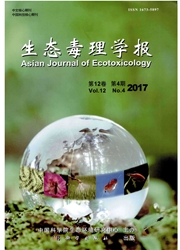

 中文摘要:
中文摘要:
为研究茶多酚对三丁基锡诱导的小鼠氧化损伤是否具有保护作用,采用灌胃方法,对雄性小鼠进行TBT染毒,然后分别用不同剂量的茶多酚进行保护。结果表明,茶多酚保护组小鼠肝组织活性氧(ROS)活性和丙二醛(MDA)含量均明显低于TBT对照组;彗星实验发现茶多酚保护组小鼠淋巴细胞尾长较正常,而尾相与TBT对照组相比没有显著改变。电镜观察结果表明茶多酚保护组胸腺细胞核和线粒体损伤明显减轻。因此茶多酚对TBT诱导的氧化损伤具有一定的预防作用,并且对细胞核损伤也有一定的保护作用。茶多酚对TBT所引起的细胞核损伤的保护作用机制可能是抑制脂质过氧化反应,防止细胞氧化损伤,从而保护DNA。
 英文摘要:
英文摘要:
In present work, the protective role of tea polyphenols on the tributyltin (TBT) induced oxidative damage in mice was evaluated. Male mice were pretreated with TBT at the dosage of 1 mg ·kg^-1· d^-1, and then tea polyphenols was garaged at dosages of 100 mg·kg^-1· d^-1 and 200 mg·kg^-1· d^-1, respectively. After 7 days, the mice were sacrificed and organs and blood were sampled for measurements of the activities of reactive oxygen species (ROS) and malondialdehyde (MDA). Comet assay and pathological observation were performed on blood and thymuses, respectively. Our results showed that ROS production was inhibited and level of MDA decreased significantly when tea ployphcnols was applied after TBT exposure, in comparison with control group where only TBT exposure was carried out. In comet assay, the tail length indicating the level of DNA damage was shorter in treatment using tea polyphenols than without measure of protection. However there was no statistical difference between the two treatments if tail moment was used as the endpoint. In pathological observation, cortical thymocytes damage induced by TBT exposure was alleviated after treatment using tea polyphenols. The results suggested that tea polyphcnols could protect both oxidative and nucleolus damages. The protective role of tea polyphenols against TBT intoxication could be through the inhibition of lipid peroxidation and prevention of the oxidative nuclear DNA damage.
 同期刊论文项目
同期刊论文项目
 同项目期刊论文
同项目期刊论文
 期刊信息
期刊信息
